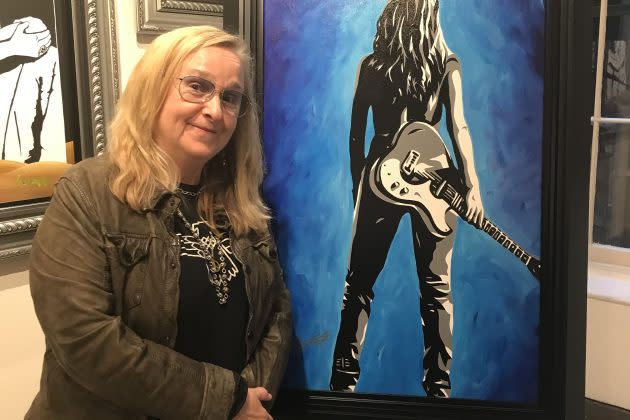Melissa Etheridge Explores Opioid Addiction, Grief and Healing With New Docuseries

“This is a beginning and furtherance of a dream that came out of a nightmare.”
That was Melissa Etheridge, the cause-driven, Grammy winning singer/songwriter/guitarist, discussing the origins of the Etheridge Foundation formed in 2021, a year after she lost her son to an opioid addiction.
More from WWD
Influential Photographer George Platt Lynes Spotlighted in New Documentary
EXCLUSIVE: Ami Paris' Alexandre Mattiussi Shows His Zany, Air-drumming Side in New Documentary
“It’s about the power in oneself to take on what seems like too much, too impossible,” Etheridge said Thursday night at an intimate roundtable gathering at the Park West Gallery in Manhattan’s SoHo neighborhood, raising awareness for the foundation. The Etheridge Foundation advocates for access to plant medicines and psychedelic therapies for healing opioid use disorder. It also raises funds to support forward-thinking scientists and people in psychology, and indigenous-led biocultural conservation projects related to the plant medicine being studied.
“The thing that really perplexed me at the time was there wasn’t many choices I had as a family member when my son was having such a hard time with this addiction,” Etheridge told the two dozen or so individuals from a range of occupations — artists, musicians, media, medicine, psychology, teaching ,as well as fans of Etheridge. They were there to learn about the foundation, possibly help in the cause, and of course, interact with the rockstar while munching on plant-based bites.
This week, Etheridge appeared on “The Today Show,” and premiered her two-part docuseries “Melissa Etheridge: I’m Not Broken,” at New York’s Beacon Theatre for the Tribeca Film Festival, where she also performed. The docuseries focuses on incarcerated women at the Topeka Correctional Facility in her Kansas hometown, substance abuse, grief and healing, and Etheridge’s original song, “Burning Woman,” inspired by letters sent to her from women in the jail.
“Drug addiction can be such a stigma and families can be filled with so much shame and guilt, especially if you lose that loved one. It’s really hard,” Etheridge said. “Just as I lost him, I thought there might be other options. I myself had been going through my own discovery of plant medicine, I am 20 years cancer free, and plant medicine, especially cannabis, had played a big part of that through my life. I have always felt it was a path that was used hundreds of years ago but we drifted away from it with modern medicine. But there is this path that has been shown, not necessarily through medical sources, but through ancient ceremonies and cultures that have used these plant medicines. It goes beyond symptoms and relief of the symptom. It goes to root issues. Getting to the crucible of change can really be helped through plant medicine. When I lost my son, I was frustrated that the only option I had was 12-Step, which is great for some, but not for everybody, especially for a young 21-year-old man who was suffering.”
Anna Symonds, executive director of the Etheridge Foundation, said 15 million in the U.S. suffer from opioid addiction, which causes a death every five minutes in the country. Plant-based medicines, she said, “help us address emotional, mental and even spiritual issues that underly so much of the physical dependence that happens with opioids in particular. The trouble is there’s a stigma against these medicines and laws against them in some cases. We need to legalize plant medicines and psychedelic therapies to help people.”
Best of WWD

